#car culture satire
Explore tagged Tumblr posts
Text
Bumper Stickers and Their Viral Meme Makeover
From ‘Baby on Board’ to Memes on Wheels: The Evolution of Bumper Stickers How Bumper Stickers Became the Original Viral Posts—and Still Cause Road Rage Written in Los Angeles, California, by Polly Tics Los Angeles, California – Long before TikTok challenges and viral tweets, bumper stickers were the original way to tell the world you had opinions. From political slogans to sarcastic quips, these…
#Bumper stickers#car culture satire#eco-conscious driving#irony on wheels#modern parenting#passive-aggressive stickers#political humor#sticker-free zone#Tesla trends#viral memes
0 notes
Text
I used to drive a truck, Tesla is to trucks, what rusty garbage cans are to housing.
44 notes
·
View notes
Text

I sus therefore I am - Christ.
#comix#exvangelical#illustration#religion#art#comic#webcomics#comics#comics on tumblr#ex christian#purity culture#cars#satire#humor#political cartoon
2 notes
·
View notes
Text
⋆ ˚。⋆୨୧˚ astrum's the secret history & henry winter thirst masterlist ⋆。°✩
hi, all! because we are slowly but surely approaching the 200 posts mark and this blog hasn't even been up for a full month, i've decided to provide all those who are new to my page a handy tool to facilitate orientation. when you expand this post, you will be greeted with a summary of all of my original posts and asks regarding the topic of my blog — incessant, tenacious, shameless thirst for the secret history's very own henry marchbanks winter.
admittedly, i am a complete sucker for lists and organizational tools, which is why this will simply be a heavenly experience for me — even more so because i'm currently procrastinating writing my term paper. however, without much further ado — find the list below the cut.
-> IMPORTANT NOTE: due to the link limit on this post, i can no longer expand it to my liking. because i don't want to create a second masterlist (just yet), however, you will find any newer uploads linked in my own reblog of this post (look in the notes).
˚₊· ❥ general — sfw, informative, personal
my opinion on tsh / addressing the problematic aspects of tsh / henry's middle name being 'marchbanks' and a possible explanation / what henry might've whispered to camilla / my opinion on whether or not henry and camilla were in love / my fancast(s) for henry / my favorite books / my opinion on dorian gray as a character (+ parallels with tsh) / comparing henry to marble statues / modern media henry would be into / elaboration on camilla macaulay / will i be writing about other tsh characters? / tips on getting into classical studies / country house daydreams
˚₊· ❥ henry winter nsfw scenarios
general headcanons about henry's sexual preferences / summer thigh riding / car sex / study date sex / mating press position with henry / riding henry / scratching his back during intimacy / bondage with henry / henry being into bdsm / henry's dirty talk part one / henry's dirty talk part two / neck teasing & biting / henry and cnc / dumbification with henry / henry sucking his partner's fingers / sucking henry's fingers / henry & cigarettes after sex / henry physically responding to pleasure / henry being distracted by your moans while studying / henry & the smell of gasoline / henry muffling you due to your volume / relentlessly teasing henry / cockwarming during studying / sex at bunny's funeral / henry calling you 'good girl' / henry and aftercare / giving henry head to cure his headache / size kink with henry / ignoring henry while he gives you head / clit spanking with henry + coming from your clit being spanked / you and henry at the beach / doggy style position with henry / henry with an inexperienced partner / inexperienced henry with an experienced partner / being bratty with dom!henry + being bratty and fighting henry back / henry burning you with his cigarette / shotgunning a cigarette with henry / jacking henry off with pretty nails / henry using his diary for dirty entries in latin
-> own category — sub!henry: general headcanons / ignoring needy sub!henry / sub!henry punishing you back / making sub!henry beg + reaction to his begging / mirror in front of sub!henry / henry still being dominant while subbing
˚₊· ❥ henry winter sfw / mildly nsfw scenarios
henry & hanahaki disease au / henry with a polar opposite partner / henry with a partner similar to judy / spoiling his partner / getting off on spoiling his partner / enemies to lovers with henry / best friends to lovers with henry / academic rivals with henry / henry being soft(er) with his partner / henry during your period / henry's birthday party at francis' country estate / falling asleep on henry whilst reading / owning a locket with henry's face in it
˚₊· ❥ general satiric / amusing scenarios
gay hampden / list of pop culture scenarios flea wants the greek class to go through / henry holding a baby / playing roblox with the greek class / greek class barbenheimer feud / locking the greek class in a room with the percy jackson movies / the greek class' opinions on percy jackson / being locked in a room with henry / henry watching reality shows with you / henry turning up at your house / showing the greek class colleen ballinger's apology video / keeping the greek class in a glass terrarium / forgetting henry in the cereal isle at walgreens / the greek class being actual people (+ bunny shitting headcanon) / bunny possibly being okay (they revoked their statement) / henry writing smut in his diary
˚₊· ❥ henry winter scenarios inspired by songs
taylor swift — last kiss / taylor swift — illicit affairs / dead girl walking part one + part two
˚₊· ❥ bonus: prose and poetry shared by my saturn anon
one — marble / two — divinity / three — dancing in the rain / four — intimacy overseas
#astrum masterlist#astrum asks#the secret history#dark academia#henry winter imagine#henry winter x reader#henry winter thirst#indulgent thoughts#henry winter smut
820 notes
·
View notes
Text
Russian Influence in Moral Orel:
Okay so a while ago I just finished watching Moral Orel and I noticed that there were some connections between it and Russian culture. I also noticed that the show had just become popular in Russia and there are dubbed episodes available on VK. Even though Moral Orel is an American TV show and the creator of the show is of Greek descent, here are some connections on the show that linked to Russian culture and social cues:
The heavy alcoholism on the show: Clay and most of the people in Moralton are straight-up alcoholics, and even Bloberta was an alcoholic before she met Clay. Of course, alcohol is a significant part of Russian culture and the country has the highest consumption of alcohol in the world. Not only are alcoholic beverages are consumed in high amounts, but is also very much socially accepted and encouraged. Even underaged children are encouraged to drink. In the episode Maturity, Orel thought drinking would make him “wise and mature” like his father and in Help young Bloberta stated that drinking alcohol “makes us better people”.
There’s a city in Russia called Orel.
Orel means “Eagle” in Russian (and other Slavic languages). So in the Russian dub Orel’s name is Eagle.
Ms. Censordoll loves pickled eggs and keeps a jar full of them in her library. Russian cuisine consists of a lot of pickled foods, including pickled eggs, cabbage, potatoes, fish, watermelon, etc.
If you notice in the Puppington household, you’ll see an oriental carpet on the living room floor. Oriented carpets are very common in Russian households and are often on floors or hung on walls.
Clay’s reckless driving and Russia is famous for its many reckless drivers and very frequent traffic accidents (I just had to add this to the list lol)
Clay’s car looks like a Lada (a Russian brand of cars).
The “depressing”, conservative, perfectionistic, and collective culture of Moralton is quite similar to that of Russian culture. The entire town is centered around a church which literally controls everything in the town and how it operates. The people are fed Christian propaganda and are not allowed to think differently or do things differently than what is socially acceptable, otherwise they would be outcasted and have to face harsh consequences. This pretty much relates to Russia’s Soviet/Communist Era of when housing, stores, businesses, etc. were all controlled by the government and not the people. People were not allowed to solely own their own property or businesses, and if they were to speak up about problems and issues facing their economy or speak out against propaganda or the government, they would would face the harsh and legal consequences (i.e. prison camp or deportation). Moralton is quite similar to that, except it’s in the United States where people have more freedom to do want they want and express themselves.
Many people in Moralton tend to be “cold”, reserved, strict, and cynical, which is a common stereotype among Russians.
The townspeople’s love for classical arts, music, and theatre, like in the School Pageant episode. Also Bloberta comes from a family of choir singers/musicians and her singing voice is similar to that of an opera singer. Russians are known for their love for classical and opera music as it is a very significant part of their culture. I’ve met many Russians who come from a family of musicians, are talented musicians outside of their occupation, or happen to own a musical instrument in their homes.
Moral Orel is a satire that explores the hypocrisy of religious and social institutions with a touch of dark humor and irony, which is similar to the works of Russian authors like Fyodor Dostoevsky, who used similar techniques to critique religious and social mores.
Moral Orel is a stop-motion animated series and Russians are very fond of stop-motion animation as it has a rich history in Russian media and cinema. Famous Russian animators such as Roman Kachanov, Ladislas Starevich and Ivan Ivanov-Vano were pioneers of stop-motion media during the Soviet Era. Many beloved animated films and shows made during the Soviet Era were stop-motion animated. Also a lot of stop-motion animated media known today (such as Coraline, Corpse Bride, Isle of Dogs, etc.) are becoming very popular in Russia. Also, Orel loves making little stop-motion movies!
Thanks for reading! 😁
#Russian influence in Moral Orel#Moral Orel#russia#russian influence#russian culture#orel puppington#clay puppington#bloberta puppington#miss censordoll#ms censordoll#moralton#bulleted list#list#text#my writing
20 notes
·
View notes
Text
Severance, Depression, Mental Health and Whatnot
It goes without saying that Severance is a commentary on late-stage capitalism, a satirical parody of cooperate culture, of worker exploitation, and much more. Of course, there is much political analysis of the show online; However, I haven’t seen much psychological analysis of the show, or really any talk of the mental health themes at all. So, I’m going to talk about it! (Everyone starts chanting “wow Sloowoo you’re so cool! You must be super popular at parties!”)
I’m not negating the political messaging, I’m just shining light on an alternative perspective I feel is relatively overlooked. Severance is a commentary on corporate society, but is is also a very powerful portrayal of grief, depression and trauma.
Mark is a nobody living an unsatisfactory life. He habitually suppresses his looming existential dread, his dissatisfaction from his job, the distress from the rocky relationship with his family and friends; Both versions of him live miserably—his innie is stuck inside an endless cycle of abuse at a job with no real meaning other than being a cog in an exploitative corporate machine, he is not viewed as a person but rather just a tool to be used for profit (and he knows that), he sorts numbers every day that he doesn’t understand, he lets his employers trample over him, and he fake-smiles at all the trivial work prizes and empty incentives; Outie Mark, similarly, is never shown to have any real personality or hobbies, he always speaks in that monotone, emotionless voice and never shows any excitement, he’s a blatant alcoholic and often falls asleep on his couch from taring at the ceiling for hours, he cries in his car alone outside of his job, he lives in a The Giver-esque town with all the same boring neighbors he’s never met, he has two lonesome isolated goldfish in an aquarium he doesn’t care about, he skims through TV channels of negative doom every night, and he has basically no real point to living if not for the simplistic ease of following the established routine, following the fact that his body wakes up every morning, the fact it is easier to drudge on in this endless toil than to actually change his life.
It’s honestly one of the best portrayals of depression I’ve ever seen. Most depression in media come with dysfunction—like Bojack and Fleabag and many other great shows—which isn't inherently bad, but functional depression is often underrepresented. Severance really captures that gray, endless, mind-numbing, soul-crushing feel of having depression but also being completely self-sufficient. It’s like being trapped. I haven’t seen anyone talk about this, but I definitely felt a subtle subtext of passive suicidal ideation throughout the show, not just from Helly’s attempt but throughout the entire thing. I could viscerally feel being an innie, standing in that elevator hoping that I won’t wake up again in the next few seconds, but ultimately knowing it is out of my control, and knowing I will almost certainly open my eyes again to the same office, and I will have to do another full day of stupid, repetitive, bullshit work, and in twelve hours I will stand in this same elevator again and that the cycle will repeat over, and over, and over.... It’s being trapped, not just physically but also mentally from, trapped by being stuck between of not having enough drive to actually commit suicide (excluding Helly of course), but constantly fantasizing about it. A good non-Severance example would be someone who doesn’t look both ways while crossing the street in hopes that a car might hit them. Someone who doesn’t really take care of their body so their health may slowly deteriorate. Someone who never reaches out first to family or friends and hopes for complete isolation. It is about a constant, obsessive fantasy of death without an actual clear plan, thus leading towards impulsive, reckless behavior, substance abuse, or subtle self harm—things that don’t really kill you, but still perpetuating a fantasy of “maybe it will”. I can imagine that this that is how an innie feels every day, every second, every moment. Dylan covers up the dread with his sardonic humor. Outie Mark is basically already living a passively suicidal lifestyle. Innie Helly is the only one to act on it. It’s not something that is directly addressed in the show, but I feel like anyone who has experienced depression can feel it through the show’s aesthetics. It is oppressive, harrowing, yet, in kind of a twisted way, undeniably beautiful:

There is a really good analysis of the aesthetic of the show by Sadie Barker on Post45, which you can read here: “A Handshake Is Available Upon Request”: Severance and the Uneasiness of Sparsity.
Lumon waters down any emotional individuality creates an abusive power dynamic by being able to control how the workers feel through the numbers. It is meaningless, unfulfilling, yet ironically, like Barker said in her article, “wholly consuming” because of the nature of emotional labor. Thus, any person who is capable of detaching from their emotions like the way Mark detaches from his grief will thrive at Lumon. The job fundamentally requires a separation of one’s own identity, a separation from need for significance, and separation from one’s owns thoughts and personality. This detachment to self reminds me of the self-destructive maintenance of shitty mental health that a lot of depressed people experience.
Helly’s outie, despite being very aware of the abuse that her innie suffers (and likely aware of the inner functionalities of Lumon given the fact that she is an Eagan), still forces herself to go to work every day. Her outie is almost sadistic to herself —“you are not a person”. To me, her extreme harshness towards her innie feels like a coping mechanism, maybe for growing up in a cultish manipulative family, maybe for the frustration of her lack of control, maybe from for some hidden trauma that isn’t revealed to us yet, or maybe for all of the above; But the way she keeps forcing herself to go back to work feels like a desperate attempt to exert control over herself. She is creating another “person” to suffer for her, and makes me think of people who try intentionally to make their mental health worse (it’ kind of a form of self-harm, isn’t it?) Or those who obsessively try to make themselves better (the kind where you don’t allow yourself the make any mistakes at all, where any slip-up whatsoever gets you all paranoid about getting worse again, like an addict getting exposed to a previously-abused substance).
Mark, on the other hand does not detach himself from his outie, and believes that all of the suffering he endures inside of the office is caused by good-conscious choices he made outside of the office , thus—“every time you end up back here, it’s because you chose to came back”. He believes that his own suffering is a choice he made and that he only has himself to blame. But also, he thinks that there must be a bigger purpose to his suffering (“the work is mysterious and important”), because his outie must have had an important reason for putting him here, right? Because there must be some higher meaning to all of it, right?
Another great detail in the show is that Mark only gets motivation to change the system once he sees others struggle (Petey, Helly’s attempt). He self-sacrifices frequently (offering to go to the break room for others) and prioritizes literally everyone but himself...it hurts. And the way that both his innie and outie are unintentionally destructive, outie him ripping up a picture of Gemma and innie him ripping up Petey’s map (and both being impulsive poor choices in the heat of the moment, in situations where he tries prove that he doesn't care, that he’s not sentimental, because admitting to attachment is vulnerable and scary and too intimate, yet he still crawls back to repair what he destroys each time, alone...it hurts!)
Additionally, Severance shows the way that grief, mental illness, addiction, trauma, yearning, or just a general depression transcends any memory or environment. As Petey says to Mark:
“At work, you’d come in sometimes with red eyes. We had a joke that you had an elevator allergy. There was even a song for it. But I always wondered. You carry the hurt with you. You feel it down there, too. You just don’t know what it is.”
Mark’s grief is something that is engraved in his nature, indestructible. This is extremely relatable, especially to those who have experienced grief themselves (whether it be personal or collective) or have experienced trauma/mental health problems: it often feels like there is a constant background hum of hopelessness, or melancholy, or frustration, no matter how good your day was, or how much you have healed, or how intensely you try to distract yourself, the shitty feeling always comes back. It is something you can’t quite put your finger on but always lingers around. Like usherparttwo said in their tumblr post:
“If you're an outie in the severance universe and you're a smoker does that mean your innie is just constantly on edge and miserable and craving something they can't even put a name to because they've never experienced it?”
Mark’s monotonous daily life is interjected with random emotional outbursts, but then the immediate dismissal of his own feelings. What his the most about this is not the actual outbursts, but the routine-ness of it: Severance captures the quiet but achingly intense desire for something more—some meaning, some excitement, some connection, something nameless that one can’t even daydream about because we don’t even know what it is, the type of desire we feel on a dull Tuesday tapping a pen on our desks out of boredom, the desire for some big, cosmological sense of fulfillment, the desire for that a sudden ultimate, axiological meaning to be enlightened upon us, like a a religion for the non-religious, a pillar of stability we can cling to and wrap our whole life around so we don’t have to think beyond daily mudanity, escapism pushed to its ends, when there is so much pain it becomes identity and the only way to cure ourselves to sever off identity, like the wallhanger on Selvig’s wall: we must be cut to heal.

#severance#severance apple tv#mark scout#ummmmm#literary stuff or stuff#tv shows hell yea#mark scout little meow meow
11 notes
·
View notes
Text
GTA IV came out on PC. It apparently isn't totally lame.
So it turns out that the boring mass murder game my older brother has is actually a really touching story about the immigrant experience/satire of American culture.
And now I'm playing this game pretty often!
God it's so fucked up in the best way, though.
...Oh my god. I'm enjoying a GTA game. I'm emphathizing with one of the short-hair white guys with guns on all of my older brother's fucking xbox games.
Driving around is also fun. I dunno why all of the cars feel like they're playing ice hockey, but I'm kinda into it.
...fuck, is this a bad sign? Am I gonna get into Pokemon next?
I really fucking hope not.
#ari class of 09#class of 09#rp ask blog#class of 09 ari#co09 ari#co09#class of 09 game#co09 rp accounts#class of '09#gta iv#gta 4#niko bellic#grand theft auto
8 notes
·
View notes
Text
Helena Harland, who runs World of Demri instagram account, has a blog at substack where she is publishing interviews she does to people who knew Demri. I asked for permission to share this entry about Demri's activism in here and she kindly allowed.
From her substack blog:
"Demri possessed a radical nature alongside immense charisma. She was a nudist, openly bisexual, modeled for several adult magazines like Penthouse and Hustler, and was unabashedly sexually liberated at a time where it was seen as taboo. She did not view other people with a critical eye, but rather embraced those who most would find “off-center”. Demri’s late mother Kathleen recalled a memory of driving 20 year-old Demri home one day when she suddenly started shouting “Mom, stop! Stop!” Kathleen stopped the car and Demri jumped out to her friend who had green skin, pointed ears, and pointed elf shoes. Demri said, “This is my friend, he’s an elf. Can we give him a ride?” Kathleen, who likely passed on to Demri her attribute of non-judgment and acceptance, gave the elf a ride as he and Demri squeaked and chirped at each other in their own elf language.
Demri’s uniqueness has always intrigued me, and I often wonder what her moral and political beliefs were, as well as what she would think of today’s political issues. The 90s were marked with many social justice issues like LGBT rights— specifically the AIDS crisis. I asked Amber Ferrano, a close friend of Demri’s what she thought about the AIDS epidemic at the time, and it can be beautifully summed up by this memory:
“Demri was bi. She loved everyone and judged no one. We went to shows in gay clubs and they were awesome. I loved that they handed out free condoms even for our crowd. AIDS was horrible at the time. I remember a few times when guys in full drag (with gloves on, mind you) put their hand out to shake and pulled back saying they had AIDS, but Demri went in for a kiss and a hug. People would make negative comments saying she had AIDS or hepatitis from drugs. She didn't understand why people were so mean. If she were here today she'd be on the frontline along with Layne.”
Demri was also visited in the hospital by the Sisters of Perpetual Indulgence, a subversive LGBT activism group that satirized traditional standards and gender roles by combining drag and religious imagery to their street performances. Kathleen said that they adored Demri, and the nurses would gawk at them on their way in.
To seek some more insight on Demri’s activism history, I reached out to Vivian McPeak, the founder of the Seattle activism group called the Peace Heathens, of which Demri was a member. The Peace Heathens were known for their annual Seattle Hempfests, and many Alice in Chains fans have likely seen this video of Layne Staley making an appearance at one in 1994. It is one of the few videos we have of Layne during that year, taken shortly after the release of Jar of Flies.
H: myself, V: Vivian
H: I was wondering what the core beliefs of the Peace Heathens are and how the organization was conceived?
V: In 1988 I had this idea to start a street-level volunteer group composed of alternative culture folks to do good things in the name of the alt-culture, community service projects and benefit shows for righteous causes that got little support from the mainstream. I called it the Seattle Peace Heathens. I created this manifesto, and Yossarrian “Rex” Kelley did a logo graphic I put at the top of it. I plastered the paper fliers all over The Ave, at places like the Allegro Cafe, Espresso Roma, and The Last Exit. I started getting lots of calls from people excited about my crazy vision quest, wanting to learn more and get involved. We started having meetings in people’s homes that eventually got too large, and we moved them to Ravenna Park, where we turned them into potluck feeds that started attracting a homeless contingent.
Meetings started attracting as many as 70 people, mostly music culture and street culture folks - hippies, punk rockers, and an eclectic mix of just progressive, activism-type people. The thing that struck me most, though, is I would be approached by some very neat and clean folks who came on really strong, talking about how resourceful they were and how they were going to contribute all these things. I became very excited about these folks and what they might bring to the group. Then there was an entirely different contingent of absolute street people. These folks were often disheveled, unkempt; they might even have a distinct odor about them. At first, I was not sure what to think about these people, and I placed much of my focus on the other group of folks who seemed to have their shit really together.
The core values of the Seattle Peace Heathens were a commitment to service to society and others through volunteerism, basic counter-culture values of peace and love, Left politics such as social and environmental justice, and a commitment to the power of change through art (visual and music).
H: -It was said that Demri Parrott was a member of the Peace Heathens, do you have memories of her attending meetings or the Hempfests?
V: [I was closer with Layne, so I’ll tell the story of us meeting first.] I was at a hard rock club called the Prime Rib Palace in Totem Lakes, Washington and I struck up a conversation with a blonde dude with long hair and silver pants. We hit it off. He learned I was fresh from Hollywood and wanted to know all about the club scene there. He said his name was Layne, and he had a band called Sleze that was being renamed Alice in Chains. He gave me his number. He was the first person I developed a friendship after I moved to Washington State. A few years later, he invited me to his apartment in a big old brick complex above Eastlake. I met his lady Demri, a petite girl with a beautiful smile and sparkling eyes. I didn't know where to buy weed, and they told me I could get my weed from them. I am not really sure if they were dealing weed or if they were just helping me out, but they always had an eighth when I needed to buy one.
Around 1988 Layne had developed a heroin problem, and I had a cocaine one. I would pick Layne up and drive us to TUNA (Tuesday Night N.A.) at the Rendezvous on 2nd in Belltown, where a guy named Will ran the Narcotics Anonymous meetings. It was pretty much the rocker NA for the area. Unlike his rock persona, Layne was a quiet, almost shy person. He was sensitive and kind,in my experience. It was stunning watching the band climb to rock stardom. I loved their music and was impressed with the strength and power of his voice.
Demri was a bubbly, outgoing person. She volunteered for the Peace Heathens and helped at several of the benefit shows we produced at the famed OK Hotel, one of the only venues with all-age shows. She helped put up posters promoting the shows around town, and at the shows, she worked the merch table and helped us load gear in and out, even though she was a very diminutive person. She was sweet and kind and fearless. She resonated with the Peace Heathens's core belief that all of the various cultural sub-genres of the music/youth/alt-culture (punk, metal, hippie, Reggae, etc.) shared a common spirit and was essentially responding to the same mainstream desire for conformity and control. She believed in the benevolent act of helping others, which was central to the Peace Heathen identity.
I hope this provided some insight on the free spirited nature of Demri, and the ways in which she provided to her community and led with love and compassion. Big thanks to Vivian for taking the time to speak with me and tell me of all his cool stories, and to MemoriesOfDemri on instagram who pointed out the Peace Heathens sticker on Demri’s suitcase as well as provided the information regarding the Sisters of Perpetual Indulgence.
Thank you for reading!
-Helena"
***
Thank you very much Helena for allowing us to share this story here!! Go and follow her on instagram or subscibe to her blog!
#Demri Parrott#Demri activist#Seattle Peace Heathens#Sisters of perpetual indulgence#Vivian McPeak#peace heathens#layne staley#1980s demri#model#artist#stylist#aspiring actress#1990s demri#muse#demri lara parrott#demri parrott murphy#Seattle Peace Heathens Community Action Group#World of Demri#instagram#blog#substack#links#follow#like#join#subscribe#memories#quotes#activist#Seattle Hempfest
18 notes
·
View notes
Text
The Satirical Horror of Junji Ito’s “Hanging Blimp”
[The following review contains SPOILERS; YOU HAVE BEEN WARNED!]
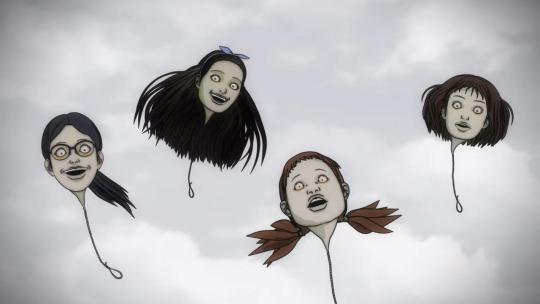
Junji Ito’s “Hanging Blimp” features a brilliant moment of dark comedy. Quite near the end of the short story, the protagonist’s family huddles around their television set, watching an emergency broadcast about the apocalyptic invasion of the eponymous monsters—gargantuan sentient balloons shaped like disembodied human heads, which strangle their prey with steel cable nooses. Literally seconds after the reporter warns citizens to remain indoors, the father stands up and casually announces that he really should be getting back to the office; he has a lot of work to finish before the weekend. When his wife and children understandably object to his cavalier attitude, he arrogantly dismisses their concerns, insisting that he’s formulated a foolproof survival plan. Abandoning both rationality and the safety of his home, he sprints towards his car, raising his arms to protect his neck—and is immediately lassoed around the waist and hoisted aloft to his grisly demise.
Later, our heroine’s younger brother likewise ventures outside, albeit for a more justifiable reason: he realizes that they will eventually run out of food should they continue to shelter in place—and as the newly appointed “man of the house,” it is his responsibility to provide for the weak, helpless, vulnerable womenfolk. His overconfidence proves to be equally fatal: when he next appears, he’s been unceremoniously slain between panels—impaled by the umbrella that he wielded as an improvised weapon.
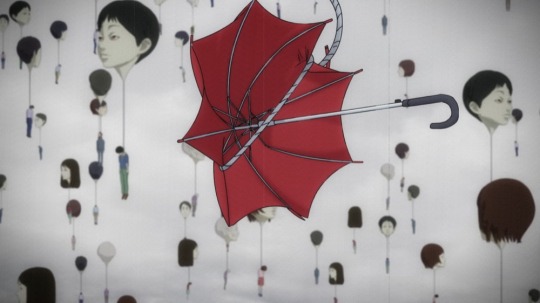
Although this social commentary is too brief and incidental to the plot to qualify as a proper theme, it is nevertheless pointed and purposeful. Indeed, the presence of such mundane horrors as machismo, patriarchy, and toxic masculinity enriches the narrative, grounding the (potentially absurd) premise by juxtaposing its supernatural elements with comparatively ordinary, recognizable, relatable conflicts and characterization. Additionally, these relatively humorous (but still macabre) scenes prevent the tone from becoming excessively monotonous, alleviating the relentless tension by lending the otherwise oppressively bleak scenario some much-needed levity—which, in turn, lowers the reader’s guard, thus making the tale’s tragic conclusion significantly more impactful.
While fans tend to reductively emphasize “Hanging Blimp’s” grotesque, nightmarish imagery—particularly the iconic visual of a schoolgirl’s skull melting into a misshapen blob that resembles a deflated soccer ball—its satirical subtext is what truly elevates it. As insightful, subversive, and culturally relevant as it is disturbing, the manga transcends such superficial genre trappings as gore, jump scares, and a creepy atmosphere. These surface-level pleasures are, of course, perfectly enjoyable, but they do not exist in a vacuum; their function is to support the work’s underlying meaning.
And any critical analysis that omits this deeper context is inherently incomplete.
[Click here for more posts on this topic. Happy Halloween!]
#Hanging Blimp#Hanging Blimps#Hanging Balloons#Junji Ito#horror#horror manga#manga#Japanese horror#writing#Halloween with Junji Ito#Halloween#Halloween 2023#Happy Halloween#I know Hanging Balloons is the most popular title for this story#but I went with the translation in my printed copy
7 notes
·
View notes
Text
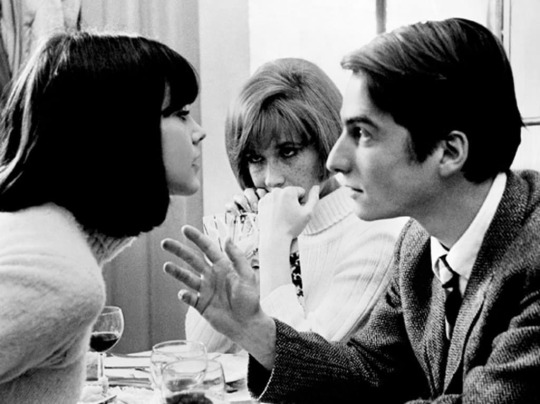
Chantal Goya, Catherine-Isabelle Duport, and Jean-Pierre Léaud in Masculin Féminin (Jean-Luc Godard, 1966)
Cast: Jean-Pierre Léaud, Chantal Goya, Marlène Jobert, Michel Debord, Catherine-Isabelle Duport, Evabritt Strandberg, Birger Malmsten. Screenplay: Jean-Luc Godard, based on stories by Guy de Maupassant. Cinematography: Willy Kurant. Production design: Philippe Dussart. Film editing: Agnès Guillemot, Marguerite Renoir. Music: Jean-Jacques Debout.
In an intertitle during Masculin Féminin, Jean-Luc Godard suggested that his portrait of French (or anyway Parisian) youth in the mid-1960s "could be called The Children of Marx and Coca-Cola." But the movie kept reminding me of Lena Dunham's portrait of American youth in the early 2010s, the TV series Girls, which might be called "The Children of Milton Friedman and Xanax." Godard's young Parisians find themselves in a time bursting with revolutionary energy but no particular channel in which to direct it other than sex and pop culture. The political activity of Godard's protagonist, Paul (Jean-Pierre Léaud), largely consists of pranks: distracting the driver of a parked military staff car so an accomplice can write an anti-war slogan along its side, and ordering a staff car on the phone under the guise of "General Doinel" -- a cheeky allusion to the role of Antoine Doinel, which Léaud played in The 400 Blows (1959) and four other films directed by François Truffaut. But most of the young people in the film are as shy of committing themselves to anything political or social as the beauty queen called "Mlle 19" (Elsa Leroy) whom Paul interviews at some length in one of the film's more spot-on satirical moments. This is a movie of fits and starts: moments of great energy interrupted by stretches of talk. As usual, Godard plays with viewers' expectations throughout, staging a sequence near the beginning in which a woman guns down her husband, only to ignore any follow-up action, and having a political protester immolate himself off-screen with only the somewhat indifferent reports of Paul and his girlfriend, Madeleine (Chantal Goya), as reactions to the event. The soundtrack is spiced with what sound like gunshots but turn out to be only billiard balls clashing against each other in a neighboring room. There is some of Godard's characteristic self-conscious "movieness" about Masculin Féminin, as when the characters go to a film within the film and Paul has to make a special trip to the projection booth to complain that it's being shown in the wrong aspect ratio. But like the best of Godard's movies it provides a necessary tonic against complacency.
7 notes
·
View notes
Text
M3GAN (2022)

What an unexpected joy. Ostensibly, this is about how children react to trauma, and the constructive or harmful ways adults react to that, paired with the question of how to parent children in a “plugged-in” world. When a car accident thrusts Gemma’s niece Lady into her life, the robotics engineer isn’t exactly a model guardian. She’s absent and distracted at a time when Cody is first trying to process her parents’ deaths, more interested in making sure the little girls uses coasters than having conversations. M3GAN presents a bandaid, a surrogate guardian so that Gemma doesn’t have to do the heavy lifting herself. But parenting with an iPad or even fancier tech carries consequences for social development. Cary goes from being distant and withdrawn to reacting violently when M3GAN is taken from her, ascribing humanity to a robot. Genuinely the scariest moment in the film is when Lady grabs a pair of scissors when demanding M3GAN be returned—how far would she go, is violence a reasonable response in her mind? Gemma made a mistake, but finds it in herself to begin helping Lady to process her grief in a constructive way.
But we really care most about the doll, right? M3GAN is the product of a company only a few steps removed from RoboCop-tier satire on corporate culture. We know the toll the doll takes on Cady’s psyche, but Funki is only interested in exploiting her situation as feel-good tear-jerk-bait.
The wildest curveball of M3GAN is that this is a backdoor Seattle film. Even if they’re gonna show the waterfront skyline, you can’t tell me this shit wasn’t mostly shot in New Zealand or some shit. Dog Lady definitely has a ‘Recall Savant’ sign in her yard.
THE RULES
SIP
Someone says 'doll' or 'toy'.
Gemma makes a bad parent decision.
Someone dies.
BIG DRINK
Insane satire advert.
M3GAN starts to dance.
#drinking games#m3gan#gerard johnstone#allison williams#horror#horror & thriller#sci fi#sci fi & action#killer dolls#brilliant cinema
4 notes
·
View notes
Note
Which Quentin Tarantino film would some of the Skins characters like?
I had no idea how to answer this so I fed it into ChatGPT to see what it would come up with. Do we think it did a good job? I kind of love that it decided Effy and Freddie both like Kill Bill the best.
Generation 1
Tony Stonem: "Pulp Fiction" (1994) Tony is charismatic, confident, and enjoys being in control. "Pulp Fiction" is known for its nonlinear narrative, witty dialogue, and complex characters—elements that would appeal to Tony's sophisticated tastes.
Sid Jenkins: "Reservoir Dogs" (1992) Sid is often seen as the awkward and lovable underdog. "Reservoir Dogs," Tarantino's debut film, features a group of criminals with distinct personalities, much like the friendship group in Skins. Sid might appreciate the film's exploration of loyalty, betrayal, and unexpected alliances.
Cassie Ainsworth: "True Romance" (1993) Cassie is a dreamy and romantic character, drawn to the notion of love and escapism. "True Romance" is a love story with a dark twist, involving a pair of star-crossed lovers on the run. Cassie might be captivated by the film's blend of romance, violence, and Tarantino's signature style.
Chris Miles: "From Dusk Till Dawn" (1996) Chris is known for his wild and reckless behavior. "From Dusk Till Dawn" is an action-packed film that starts off as a crime thriller and later shifts into a vampire horror movie. Chris might enjoy the film's mix of adrenaline-fueled action and unexpected genre shifts.
Jal Fazer: "Jackie Brown" (1997) Jal is intelligent, talented, and ambitious. "Jackie Brown" is a crime drama that centers around a smart and resourceful flight attendant caught up in a money-smuggling scheme. Jal might appreciate the film's strong female lead, intricate plot, and Tarantino's homage to blaxploitation films.
Maxxie Oliver: "Death Proof" (2007) Maxxie is a talented dancer and openly gay character. "Death Proof" is a homage to exploitation films, featuring strong female characters and thrilling car chase sequences. Maxxie might enjoy the film's stylish aesthetic and empowered portrayal of women.
Generation 2
Effy Stonem: "Kill Bill: Volume 1 & 2" (2003, 2004) Effy is enigmatic, mysterious, and carries an air of danger. The "Kill Bill" films follow a vengeful assassin seeking retribution against those who wronged her. Effy might resonate with the films' themes of revenge, resilience, and the complex dynamics between the characters.
James Cook: "Inglourious Basterds" (2009) Cook is rebellious, unpredictable, and often involved in confrontations. "Inglourious Basterds" is a WWII film that showcases a group of Jewish-American soldiers seeking vengeance against Nazis. Cook might appreciate the film's audacious storytelling, intense dialogue, and explosive moments.
Naomi Campbell: "Django Unchained" (2012) Naomi is intelligent, politically aware, and passionate about social justice. "Django Unchained" is a revisionist Western that explores themes of slavery and revenge. Naomi might appreciate the film's exploration of racism, its sharp dialogue, and the strong performances by the ensemble cast.
Emily Fitch: "The Hateful Eight" (2015) Emily is compassionate, introspective, and has a strong sense of justice. "The Hateful Eight" is a tense and dialogue-driven film set in a post-Civil War Wyoming blizzard, featuring a group of strangers with hidden agendas. Emily might be drawn to the film's moral complexities, suspenseful atmosphere, and character-driven narrative.
Katie Fitch: "Natural Born Killers" (1994) Katie is bold, impulsive, and occasionally manipulative. "Natural Born Killers" is a controversial film that delves into the media's obsession with violence and celebrity culture, following a pair of murderous lovers on a killing spree. Katie might be intrigued by the film's exploration of societal issues, its frenetic editing style, and its dark satirical commentary.
Pandora Moon: "Once Upon a Time in Hollywood" (2019) Pandora is eccentric, bubbly, and often lives in her own imaginative world. "Once Upon a Time in Hollywood" is a love letter to the golden age of Hollywood, set in 1969 Los Angeles. Pandora might be enchanted by the film's nostalgic atmosphere, charismatic performances, and its blend of fiction with real-life events.
Freddie McClair: "Kill Bill: Volume 1 & 2" (2003, 2004) Freddie is a laid-back, free-spirited character with a love for music. As mentioned earlier, "Kill Bill" might resonate with Freddie due to its stylized action sequences, strong characters, and a story driven by themes of revenge and redemption.
Thomas Tomone: "Jackie Brown" (1997) Thomas is a thoughtful and introspective character. "Jackie Brown" revolves around a complex heist plot and features characters with hidden motives and intricate relationships. Thomas might appreciate the film's nuanced storytelling, its exploration of moral ambiguity, and the strong performances by the cast.
JJ Jones: "Pulp Fiction" (1994) JJ Jones, often referred to as "JJ," is known for his quirky personality and sense of humor. "Pulp Fiction" is a nonlinear crime film with a darkly comedic tone, featuring interconnected stories and eccentric characters. JJ might appreciate the film's witty dialogue, unconventional narrative structure, and the blend of violence and humor that are hallmarks of Tarantino's style. (I had to give it JJ twice because it mixed him up with Cook).
Generation 3
Franky Fitzgerald: "Kill Bill: Volume 1 & 2" (2003, 2004) Franky is a complex and introspective character who explores their own identity throughout the series. "Kill Bill" could resonate with Franky due to its themes of self-discovery, vengeance, and the journey of a strong female protagonist.
Mini McGuinness: "Death Proof" (2007) Mini is portrayed as manipulative and calculating, with a strong personality. "Death Proof" is a film that explores themes of power dynamics and features strong female characters. Mini might appreciate the film's feminist undertones and its blend of action and suspense.
Grace Blood: "True Romance" (1993) Grace is depicted as a sweet and kind-hearted character who values love and romance. "True Romance" is a love story with a dark twist, which might appeal to Grace's idealistic and emotional nature.
Liv Malone: "Pulp Fiction" (1994) Liv is known for her rebellious and free-spirited nature. "Pulp Fiction" is a cult classic with unconventional storytelling and a mix of dark humor and intense moments. Liv might resonate with the film's non-linear narrative and its portrayal of characters living on the fringes.
Rich Hardbeck: "Reservoir Dogs" (1992) Rich is an introverted and mysterious character with a love for music. "Reservoir Dogs" features a group of criminals with distinct personalities, and the film's focus on a botched heist and its aftermath might intrigue Rich's analytical mind.
Alo Creevey: "From Dusk Till Dawn" (1996) Alo is portrayed as carefree, fun-loving, and somewhat mischievous. "From Dusk Till Dawn" starts off as a crime thriller and then takes a supernatural turn, which might appeal to Alo's sense of adventure and his love for excitement.
Nick Levan: "Inglourious Basterds" (2009) Nick is known for his rebellious and impulsive behavior. "Inglourious Basterds" is a WWII film that follows a group of Jewish-American soldiers on a mission of vengeance. Nick might appreciate the film's themes of rebellion, justice, and its stylized action sequences.
Matty Levan: "Jackie Brown" (1997) Matty is often portrayed as mysterious and enigmatic. "Jackie Brown" revolves around a heist plot with intricate relationships and hidden motives. Matty might appreciate the film's complex characters, morally ambiguous situations, and its exploration of trust and loyalty.
16 notes
·
View notes
Text
decided to watch postal (2007) today because i was planning to watch falling down (1993) tomorrow and thought it would be fun to compare the two In My Mind. having now completed the entirety of its strangely bloated runtime, i'm left wondering: is this post 9/11 americana? just enough the satire from it's source material is retained to the point where it resembles an era that is both over and yet constantly being reinvented. the ultra militaristic nationalism that gripped the 2000s is likewise the most culturally prominent thing about that period, but for the guys who didn't want to go off and join the military, who just went to work and went home, who lived in the background of the Brave Serviceman illustrated by the news and felt emboldened by the imagery while not vested enough in the issues to participate in the conversation meaningfully, this film was made for them.
for the average north american at the time, the reality of war was so distant that the most palpable one could make terrorism to them was in the form of symbols. i recall around the early 2010s (not too too many years after this film was released), the conversation surrounding the war had morphed from "we have to go there to defeat the terrorists" to "are we still there?". since 2001, there hadn't been any foreign upsets to the western way of life similar to 9/11; therefore, many assumed that symbols had prevailed. fictitious heroism and parades and the wal-mart discount bin 9/11 memorial albums had diffused international tension with pure american spirit. for the libertarian weirdo, this is postal (2007), where You, nebbish average guy who hates his wife and job, can defeat the taliban, and political correctness, and the talking heads on the news who say confusing things- all from your hometown in Arizona, by satirizing them into abstraction. their presence in your life is purely ideological, immaterial, and thus, defeating them is merely a matter of embracing the Brave Serviceman in your mind. funnily enough, this is a more honest mentality that the jarheads riled up by watching footage of the towers falling on loop like it's an america's funniest home videos gag into thinking theyre going to 1v1 cagematch osama bin laden himself. you see what I'm getting at though, right? we are living in gamer times.
i'm also going to be completely honest and say that zack ward was a funny casting choice for this film. even though they've toned down the character of the postal dude from a thirtysomething year old edgelord to a socially awkward moe moe kyun everyman guy who has everyman beef, his face is too innocent for this role. too boy next doorish. when they lean in to his character's more innocent behaviours, I think "he shouldn't be here, he should be working at a car wash. it's incredible he landed this role because i can't even imagine him pissing on himself on purpose.".
17 notes
·
View notes
Text
PK (2014): A Satirical Masterpiece That Questions Beliefs and Humanity
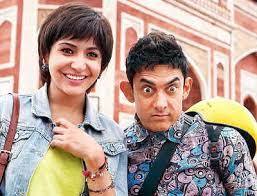
Introduction
Bollywood has produced its fair share of thought-provoking films, but "PK," directed by Rajkumar Hirani, stands out as a truly exceptional piece of cinema. Released in 2014, this satirical comedy-drama took the Indian film industry by storm and sparked discussions on religion, superstition, and the essence of humanity. In this blog post, we delve into the world of "PK" and explore what makes it a cinematic masterpiece.
watch the latest updates about the Salaar film
Plot Synopsis
"PK" tells the story of an innocent and curious alien named PK, played by Aamir Khan, who arrives on Earth but loses his communication device (resembling a remote control) that he needs to return home. In his quest to retrieve it, PK finds himself in the midst of human society, navigating cultural diversity, religious beliefs, and societal norms.
Satire with a Heart
At its core, "PK" is a satirical take on the complexities of religion and belief systems. PK's childlike innocence and inquisitiveness lead him to ask profound and often uncomfortable questions about the practices of various religions, exposing the absurdity of some rituals and customs. The film doesn't aim to mock but rather to encourage introspection and critical thinking.
Aamir Khan's Stellar Performance
Aamir Khan's portrayal of PK is nothing short of remarkable. His physicality, expressions, and mannerisms capture the essence of an otherworldly being trying to comprehend human behavior. His performance is a masterclass in subtlety and nuance, making PK a character that is both endearing and thought-provoking.
Pushpa 2 update - check now
Anushka Sharma's Jagat Janani
Anushka Sharma plays Jagat Janani, a young journalist who befriends PK and helps him navigate the complexities of human society. Her character adds depth to the narrative, and her chemistry with Aamir Khan is a highlight of the film.
Supporting Cast and Music
The film boasts a talented supporting cast, including Sushant Singh Rajput, Boman Irani, and Sanjay Dutt, who contribute to the film's overall charm. The music, composed by Shantanu Moitra and Ajay-Atul, complements the story beautifully, with songs like "Chaar Kadam" and "Love Is a Waste of Time" leaving a lasting impact.
Impact and Legacy
"PK" was not just a box office hit; it was a cultural phenomenon. Its thought-provoking narrative sparked conversations about religion, secularism, and humanity across India. Some of the film's iconic scenes, like PK standing outside a church, mosque, and temple with a transistor, became emblematic of its message.
Check Vijay Thalapathy movies
Conclusion
"PK" is a cinematic gem that blends satire, social commentary, and heartfelt storytelling. It challenges us to question our beliefs, transcend religious divides, and rediscover the essence of humanity beneath the trappings of organized religion. Aamir Khan's brilliant performance, coupled with Rajkumar Hirani's direction, makes "PK" a must-watch film that continues to resonate with audiences, reminding us to keep asking questions and seeking answers. It's not just a movie; it's a journey of self-discovery and enlightenment.
2 notes
·
View notes
Text
Character Intro: Neicus (Kingdom of Ichor)
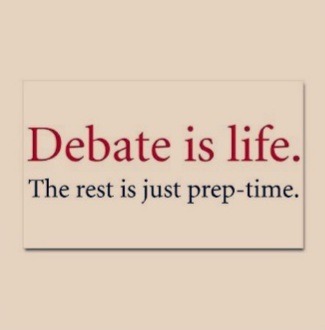

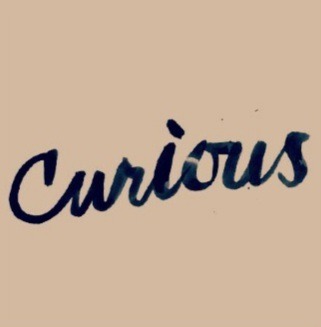





Nickname- The Blond Brain by Dione
Age- 35 (immortal)
Location- Skyline district, New Olympus
Personality- He's intellectual, cool, & suave, viewing debate as one of the greatest intellectual arts. He's single.
He has the standard abilities of a god except shapeshifting. As the god of debate & appeal his other powers/abilities include speech manipulation, dispute inducement, vocal projection, and seductive magnetism.
Some members of his family includes his younger sister Dimósia (goddess of debate) & niece Peitho (goddess of persuasion & sensuality). His relationship with his sister is good despite their busy schedules, but he hasn't been around his niece much.
Neicus shares a condo in the Skyline neighborhood of New Olympus. He lives in The Parthenos Plaza with his best friend Favian (god of philosophy). Neicus gets around in a sleek silver sports car & has been thinking about possibly getting a pet griffin!
He takes great pride in his appearance and physicality. Neicus has a whole skincare routine & keeps his facial hair neatly trimmed. He often frequents the medical office of Paean (goddess of physicians) at the royal palace on Mt. Olympus for teeth whitening, the plaza's gym for a high cardio workout, and the Gold Rays tanning studio for a healthy looking golden bronze glow. Neicus describes his personal style as "sophisticated casual." He opts for quality over quantity when it comes to his wardrobe- pressed silk shirts, khakis, as well as fine leather shoes, sneakers, & sandals going upward of 500 drachmas a pop! He also has his suits expertly tailored.
A go-to drink for him is a white russian. He also likes dry martinis, scotch on the rocks, pinot grigio, champagne, negronis, rum & cokes, and beer. His usual from The Roasted Bean is a large decaf espresso.
His go-to thing to eat for breakfast is the chipotle chicken, scrambled egg, & avacado sandwich on ciabatta bread from The Bread Box. He'll also order hash browns, sweet potato home fries, and turkey sausage patties from The Hearthside Diner.
Neicus' bond with Favian is deep. They like to think of themselves as brothers. They even got matching friendship tattoos on the inside of their wrists.
A guilty pleasure for him are buffalo wings! He opts for a 20 piece whenever he goes to Olympic Chef.
Neicus' main source of income comes from being the head of the communications department at New Olympus University. He personally teaches the new media communications class. Neicus is also an esteemed speechwriter, even writing the speech that King Zeus delivered on the country's millennial anniversary celebration! For other means of income he models for/endorses Platinum Alchemy, Cerulean Stone, Ouránio Théama, & Thunderstruck (Zeus' underwear brand). Neicus is also a frequent political commentator on The Agnostic Network. With his personal ventures, he's trying to step into the world of professional boxing.
His favorite dessert is the mille-feuille from Salon du Sucre, the patisserie owned by Aphrodite (goddess of love & beauty).
In the pantheon Neicus is friends with Pathos (god of emotion), Litismós (goddess of culture), Sophia (goddess of thought); his best friend's sister, Porus (god of resourcefulness), Eikono (goddess of iconography & literature), Nomos (god of laws), Horkos (god of oaths), Kéfi (goddess of mirth), Aion (god of time, eternity, & the zodiacs), Aplistos (god of avarice), Dione, Momus (god of mockery, satire, & ridicule), Amphictyonis (Amy) (goddess of diplomacy), Hydros (god of water), several river gods including Achelous (god of freshwater), Priapus (god of fertility, vegetable gardens, livestock, sexuality, & masculinity), Rhapso (goddess of sewing), and Chiron (the immortal centaur).
As for his love life, Neicus is enjoying not being tied down in a relationship. A new development has been him & Rhapso getting more flirtatious and familiar with each other, including a situation that happened in her dressing room where Neicus gave her a foot massage after she was complaining about her stiletto heels. Despite finding her incredibly attractive, he hasn't made a real move for fear of ruining their friendship. Neicus shared a kiss with Apheleia (goddess of simplicity) at an induction ceremony & has dated Nymphe (goddess of self-care). He's currently seeing a theater actress, a mortal woman named Petroula Aetos.
His all time favorite food are king crab sushi rolls.
In his free time Neicus enjoys reading, writing, playing video games, football (soccer), swimming, golf, sunbathing, basketball, poker, tennis, bike riding, playing pool, and surfing.
"You don't win a debate by suppressing discussion. You win it with a better argument."
#my oc#original character#my original oc#oc character#my character#my oc character#oc intro#character intro#oc introduction#character introduction#modern greek mythology#modern greek gods#greek myth retellings#greek gods#greek mythology#greek pantheon
2 notes
·
View notes
Note
With the decreasing popularity of Twitter, I'm curious what your take is on naming social media apps in books. Instagram seems pretty perennial, but I think many people thought that about Twitter... so in the case of, for example, a manuscript that relies on social media as part of its storytelling/plot (in the vein of Tweet Cute), do you have any advice on not "dating" your writing? Is referencing Twitter basically obsolete at this point, for books published from here on out?
This question is sort of similar to another I get asked a fair amount, which is, are authors allowed to "name drop" specific brands / media companies / social media, etc. The answer to which is basically, sure, but SHOULD you?
Naming specific current companies is, IMO, a bad idea if you want your book to be timeless, because you have no idea if, in three or five or ten years time, that company will be forgotten, or a joke.
For example: "Friendster" and "MySpace" and "NeoPets" were insanely popular -- but pretty much the only way they'd get said in a current context is as a punchline or a nostalgic throwback.
So unless you WANT your book to be tethered to a specific time and place, I'd avoid that. And maybe you do! Like, a book about tech-savvy teenagers that is set in 2006 would likely include MySpace, your MC might have a hot pink Motorola Razr flip phone, and drive a new mint-green VW beetle. If your book is NOT specifically set in 2006, but is rather supposed to be "now" (whenever now is to the reader -- but basically, 2023 or later) -- it would be rather weird to include any of those items, because like -- they aren't popular or a thing anymore?
So you might say, OK, I'll make it be Twitter or Insta, and an Apple 13 Pro iPhone, and a red Tesla 3. And sure, if your character is the type of person who WOULD namedrop those specific things, and you don't mind the story sort of being tied to "2022/23-ish" -- no problem. But I guarantee you that in ten years time, those specific brands/models will mean something different to people, for better or for worse.
ETA later bc I'm still thinking about this lol: I'm currently listening to YELLOWFACE, which is set in the world of contemporary publishing, and there's a lot of talk about Twitter specifically -- and yes, that means that future-people will know it was set sometime in the late 20teens/early 2020s -- but THAT'S FINE, because it IS speaking to a specific contemporary moment, "cancel culture", cultural appropriation, toxic/scary online activity, "who-is-allowed-to-write-what", etc etc -- while I don't THINK she says the year (though she might???), I do think that it is supposed to be now or now-ish -- and ten years from now when Twitter is long gone and likely our conversations around all that stuff will have shifted in some way as well, it will still totally make sense to the audience. And in 100 years, it will seem like a relic of a day gone by, but also resonate with those audiences in different ways perhaps, like how we read satire from the Olden Days.
ANYway -- if you want to sidestep all this, there's an elegant solution that will give you more longevity -- be a little more generic and don't say the name brand, or just make something up? While Twitter itself is kinda obsolete already, social media generally isn't -- there will probably always be SOME kind of social media sites as long as we have internet to connect with people. While the Razr flip phone or an Apple IIc are relics, people will likely always have SOME kind of computer or phone, at least for the foreseeable future (and if they don't, and instead we are in a post-apocolyptic water world or something, I highly doubt reading books will top of mind)!
So just say phone, or smartphone, or tablet, or laptop, rather than iPhone or iPad or whatever. Say "convertible" or "SUV" or "minivan" or whatever instead of a specific model. Like "When I was 16, my grandma got a new car and gifted me a 20 year old grey beater that sort of smells like cigarettes and makes me feel like an undercover cop." Say "my notifications were blowing up" or "I told myself I wouldn't check social media..." instead of "my twitter" specifically -- or make up a site that everyone goes to. "We're not allowed to check Kloutt at school, but as soon as the school bus comes, everyone whips out their phones.."
Say "mint green convertible" instead of VW beetle -- OR, specify that it is a "vintage mint-green VW beetle" so that it's not supposed to be new -- and that also evokes a specific type of character.
(Ah, how well I remember the fact that Lila Fowler in Sweet Valley High drove a "lime green Triumph" -- that company already was basically done by the time the books came out, and rare in the US, so by naming that brand specifically the author was saying Lila is a 16-17 year old who owns a rare and flashy vintage sportscar, labels and exclusivity mean a lot to her (and her dad who bought it for her), she's horrifically spoiled, they aren't just rich, they are RICH-rich, etc. You could even, based on the context around it, surmise that not only is she a snob/"mean girl", but that her parents buy her fancy presents instead of giving her quality time, and that is probably why she is such a beeyotch and has daddy issues! That's a fair amount of characterization that comes just from name-dropping a car!)
OK I'm just naming things now lol - you get the pic, right?
5 notes
·
View notes